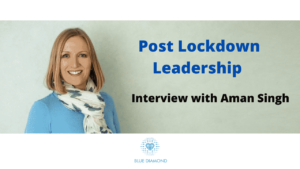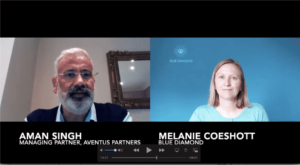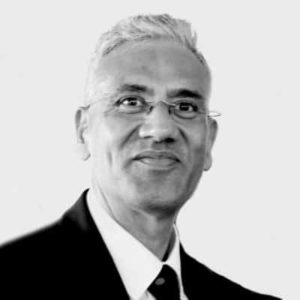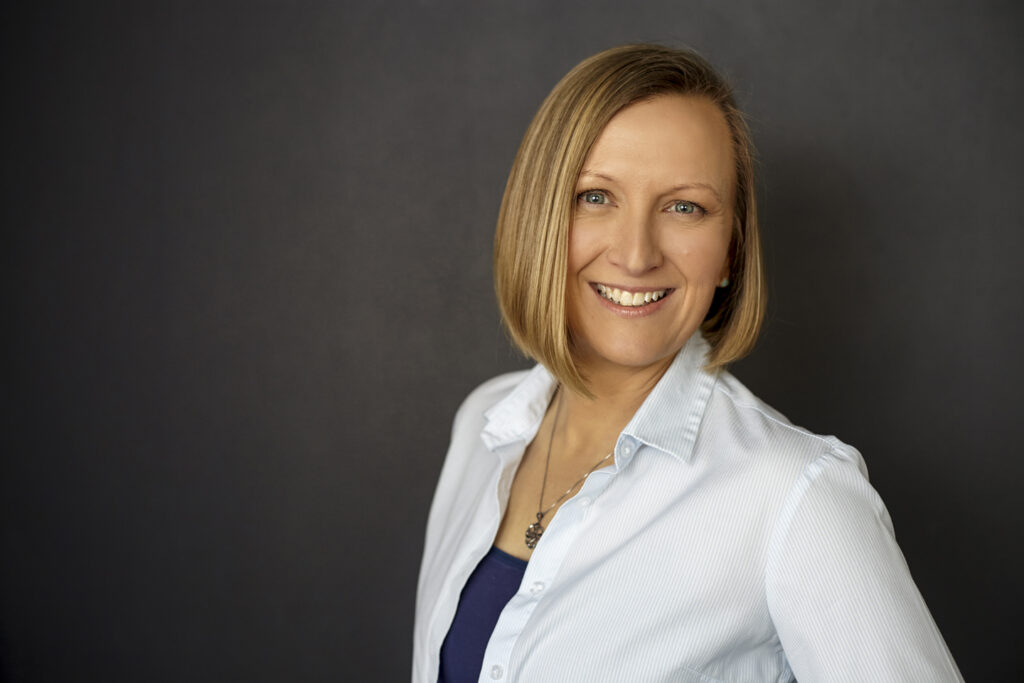
This interview with Aman Singh forms part of the Blue Diamond Post Lockdown Leadership Review.
We discuss what great leadership looks like, how to practice self-leadership, and leadership traits for career success.
In addition, we look at anticipated changes in working practices and key skills for success in the post-lockdown economy.
Watch the interview with Aman Singh here

Melanie Coeshott (MC) Good afternoon. This afternoon I’m talking to Aman Singh from Aventus Partners. Welcome, Aman.
Aman Singh (AS) – Thank you for giving me the opportunity to have this discussion with you.
MC – The pleasure is mine!
Obviously, you are a business leader – you manage a firm of accountants – and you’ve probably worked with some great leaders along the way.
What does great leadership look like to you?
AS – When looking at a professional service firm, and I think this would apply to any business and probably the non-business environment itself as well, great leadership for me characterizes someone who’s got both professional wills as well as humility. I think both things are very, very important.
By professional will, I mean someone who has a deep and unwavering desire to create an enterprise that can continue to survive for years to come. Even to do whatever it takes to create benefits for the organization. The focus is on the organization before anything else, and that includes the people within the organization. That would probably be the first and foremost part of their nature and characteristic.
The other characteristic of someone having a great professional will would be someone who’s willing to learn, continuously learn and grow, and help everyone around them to also grow and succeed. This is someone who is trying to build an organization that has lots of successes, so basically, the team needs to develop alongside them, and it is based on trust and relationships, and collaboration.
By humility, it would be someone who’s humble, who’s modest, and has inspiring standards within the organization and outside as well.
This could be both on a personal level as well as a business level. Someone who is willing and always able to take responsibility for failure, and someone who is happy to share or even give credit for all successes to others. This is someone who is not greedy, not just in the financial sense, but also in their professional environment to take credit for all the successes themselves, shunning the efforts made by the team for their success to truly happen.
I think for me those two are very, very important.
Humility is probably number one I think, and the professional will because you need the grit to succeed whatever the size of the business that may be. Some of my favorite leaders, both within the business world and the professional world and even on a personal level, were people who are humble. From Nelson Mandela to some of the great business leaders of today.
MC – Thanks so much. Some great combinations there.
How do you interpret self-leadership and how do you practice it?
AS – Self-leadership for me would encompass someone who is continuously willing and wanting to learn.
Someone with a mindset where they’re ready and willing to learn their craft, hone their skills and keep developing themselves so that they can be ready and willing for the next job that comes through.
Self-leadership in my mind would entail a thirst for knowledge. There would be a willingness to let go, and some sort of goal setting and wanting those goals.
Those would be three key areas for anyone who wants to go down the path of creating self-leadership for themselves.
In order to be the first one, a willingness and enthusiasm to learn. Within my own business, which is a fairly small business, I have created an objective for myself to be there to train everyone from the leaders in the team to the young trainees who join our firm every year. In order for me to meet that objective, I need to continuously improve myself, to meet my desire to help people improve themselves. The thirst for knowledge is I think paramount for self-leadership.
The other central element for me would be to have goals both personal and business. In today’s world, business and personal lives are quite intertwined. There is that responsibility on both sides. For both, you need to have goals that you set and you then monitor those goals. This could be something that needs to get continuously changed as you age, as you live your life, and as new challenges come into the business or your personal lives. Having the vision, possibly even having mind maps on both sides, where you set targets and goals for yourself and then you monitor yourself against those.
Finally, would be the willingness to let go so that one can focus on the most important things that one needs to achieve, and that also requires courage and trust in the people. In the business environment, we call it delegation. For me, that’s very, very important as being a self-leader I need to be able to delegate responsibilities to my fellow colleagues, and collaborate with them in order to actually not only build their confidence and their abilities but also to share the success with them.
Those three things would be the most important for being a self-leader. I think on a more philosophical level, I would say that one needs to have knowledge of your personal objective in life and know what one wants to achieve in life, and what one wants to be remembered for.
The true metric of anyone’s life lies in being able to touch as many people and helping them try to grow and try to develop and try to succeed. I think that has given me personally the maximum amount of happiness. I think self-worth, would be the word that I would describe myself. It gives me more self-worth knowing that I have an objective where I can touch other people’s lives and help them become better people. If I’m to achieve that in itself, I need to always focus on myself and see how I can better myself.
MC – That’s a great answer.
I know that you are the Head Partner in your firm and you’ve got a number of staff that you lead.
What signs of leadership do you look for from members of staff?
Those that are ready for promotion or just ready to, I guess, take on additional responsibilities.
AS – The first and most important characteristic that I look for is that there is the ability to care. To care for each other, and also to care for the clients. That person must be willing to stand shoulder-to-shoulder with others. It doesn’t matter where they are in their career path. It could be a trainee to some of our senior leaders in the team. They must be willing to sacrifice themselves almost, like someone in the army would do. To be able to stand shoulder-to-shoulder with their colleagues, and help wherever it’s needed. That’s I think the most important sign. There’s also got to be that care for your client and that care would mean that you’re delivering on time, you meet your promises, you take responsibility for your actions, and you’re accountable within your team and outside to the clients themselves.
That characteristic is quite evident as you start to interact with each other. You can actually see who is willing to get up and put their hands up for helping another colleague as and when required, and the ones who would shirk away from that. Those would only focus on their work, get that done, and probably leave and not be able to add that extra bit for their colleagues.
Another thing that I’m looking for a little bit harder is grit, and that grit is important because we’re a small organization. I think that it really doesn’t matter the size of the organization, but if you’re gritty, and by gritty, I mean willing to task yourself when you fall, have that positive mindset to be able to not give up.
We are accountants so we always have lots of challenging battles to deal with on behalf of clients. Internally within our own resources, there is always a need for grit and that, I think, is a defining factor. That develops over a period of time. There’ll be people who’ll fail the exam. As long as they’re willing to work hard and achieve those obstacles, it gives me an indication of whether they are there for the long haul or not. Our profession is quite rigorous and exacting that way, so you need to have that positive mindset and grit in you to succeed in our profession.
Finally, I think we would also be aware someone is willing to learn. That love for knowledge, because in our profession we need to continuously learn, whether it’s the tax rules or the changes that are coming in the auditing environment. Every year there’re new rules that need to be followed. If you’re not willing to or don’t have a love for knowledge, you can’t really progress in your profession.
I think all those three things are very, very important, probably equally important, and that’s what I’m looking for within the team.
MC – Obviously, we’ve been through lots and lots of changes over the last three or four months and we’ve probably got more changes to come that we’ve not encountered yet.
What changes in working practices do you envisage in the next 12 months and beyond?
AS – The last few months have been unprecedented. No one could have ever foreseen the challenges that have happened. The biggest change for a lot of us is working from home, and I would say an extension of that would be flexible working and virtual working, with both teams working together with each other. I think those are the signs of time and this is going to stay.
Had you just spoken to me four months back and said, “Would you be willing to let your colleagues work from home?” I would have probably said “no”. Not that I don’t trust them. We’ve got a great team here. The majority of the people I have worked with for a number of years, so there is a huge amount of trust between us. I’m probably old school when I say that I prefer working with people alongside each other, but I think flexible working is going to be the new norm.
Luckily for us, working from home worked out very well. The firm was set up on the basis that we could work remotely from anywhere, although that had never been tested. Even before the lockdown, we made a decision that we would all work from home for safety, and from the second week of March, we’ve all been working quite effectively and efficiently from home. It comes with its own challenges, but I think it’s been seamless for our clients. Apart from being a little lonely and a little desperate at times with the IT, everything seems to have gone very well. Flexible working, again, this was something that has come out of these unprecedented times.
We have a number of young mothers, three members that have got young families, so we have to accommodate everyone. That means that people could work at whatever time suited them as long as the client deliverables did not get affected. If they were going to be affected, then at least we communicate with them early enough and manage expectations. I think those two are things that will continue to stay with us as we forge ahead in these new times. A number of very large companies are already doing this. I know Google and some other large organizations have said that everyone is going to work from home. There will be flexible working and this is going to continue until the end of this year and may continue into the future as well. I think that’s here to stay.
A lot of these things will come with their own challenges. People are talking about productivity, which hasn’t affected us, but I think that’s going to be a challenge – monitoring team members and deliverables. There are IT tools that you can use and we are trying to look at those ourselves. Those are going to be some of the challenges. There’s also about keeping all the team members involved. I think as we work remotely, there may be people who feel a bit more vulnerable. Not everyone is an extrovert. There are some introverts who may come on calls, may not express themselves, and may not be able to communicate enough, and their well-being would be very, very important. We may need to have more empathy and compassion for certain members as they feel a little isolated.
Finally, there may be a challenge when you have new people joining the team. We’re now interviewing our trainees for this year, and I’m not sure how we’re going to get them, not only in their early learning but also get them to understand our culture, our business ethics, and our way of working. This is going to be a big challenge and I think this is there to stay as well. Getting that comfort from a Zoom interview may not happen. It doesn’t give me that feeling, so let’s see how things go.
MC – Great, there’re a number of great points you raise here.
How will you manage yourself and others through this time?
AS – Right at the outset, there was that concern. I was a little nervous, and in the first couple of weeks, I was quite nervous about how this was going to go, and how this was all going to pan out. No one really knew those early days.
Things have settled down, and I think the two things that counted for me more than anything else were, one would be to be flexible with the team members. This was something new for everyone. We were having to be very, very flexible with each other, and more importantly, communicate with each other and communicating with our clients. That was key.
The next thing was being compassionate. There were a couple of our team members who were struggling with IT, who were struggling with working from home due to their family environments – the accommodation they had or the facilities they had, and trying to make sure that we were there to support each other.
Other than that, I think it’s being positive and looking forward to a better tomorrow and having that message going through the ranks.
These are unprecedented times. A number of our clients are facing the challenges that we are all hearing in the media, and being there for them with a positive mindset. Saying, “Yes, no problems. We can get through this as we’ve done in the past.”
Positivity, flexibility, and communication are the three things that I’ve been working on.
MC – A great combination
What skills do you perceive will be most helpful to get us through this period?
AS – I might repeat myself here!
I think it’s going to be communication, both internally and externally.
Having those channels open and being willing to listen to your clients. A lot of times you can’t really help as such, but being there with a listening ear is more important than anything else. Everything from the government, the facilities that the government is providing businesses with, being there to support them with their cash flow challenges. Communication is very, very important, and in some cases, it will almost be on a weekly basis.
Internally, I’ve tried to communicate twice a week with every member of the team. With some team members, it’s been a lot more. We’ve been extremely busy. Our busiest period is between Jan and June, so we were in the middle of our busy season when the lockdown happened. It was important that we had communication channels open, and that helped us to be resilient and deliver on time. As things come back to normality, that communication and empathy have to remain. That would be very, very important. I think we need to be courageous and brave. In the next 12 months, no one knows how this will turn out, so there will have to be courage. Courage would be another important aspect of all our characteristics.
MC – Great. Thanks, Aman. It’s been really useful hearing your insights today. As you said, none of us know exactly what’s going to happen, but having a bit of that courage and flexibility is surely going to stand us in good stead.
AS – Absolutely. Thank you, Melanie. Thanks a lot.
Thanks to Aman Singh, Managing Partner at Aventus Partners and KNAV UK

Thanks for reading. Check out other Blue Diamond articles to help you take control of your work and life.
Check out the other interviews in the Post Lockdown Leadership Review series.

